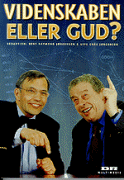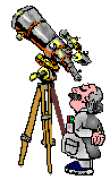



In connection with the popular danish TV lectures entitled "Science or God?" ("Videnskaben eller Gud?"), the Danish Broadcasting Corporation published a book with the same title, in which some of the leading Danish scientists bring us up to date on the organization of the world and give us an insight into the visions, which also pertain to science: Brain research, the origin of life, worm holes, Einstein's relativity theory, and much more.
The following is quoted from the cover of the book "Science or God?":
He (Bent Raymond Joergensen) is the author of a number of well-known lecture series, including the classic lecture series "Science or God?" at the Niels Bohr Institute. He and Uffe Graae Joergensen, university lecturer from the Niels Bohr Institute, have edited the book "Science or God?", which is co-authored by several of Denmark's most prominent scientists and intellectual leaders:(In 2005 a new revised editon will be published.)This book deals with the same issues as the TV series "Science or God?", which was featured on the Danish Broadcasting Corporation's channel DR1. The book was positively received. The newspaper Information commented: "An example of excellent pedagogy and communication skills" - and in the autumn of 1998, the book was published in a revised edition.
- Jens Martin Knudsen
- Hollis Ralph Johnson
- Uffe Graae Joergensen
- Claus Emmeche
- Benny Lautrup
- Rasmus Fog
- Holger Bech Nielsen
- Bent Raymond Joergensen
- Bent Melchior
Bent Raymond Joergensen's own chapter addresses these central questions:
"Is science the tool for distinguishing between truth and fallacy? Does science look into reality or merely a reflection of reality? Is science experiencing a crisis of cognition? Can we trust scientists and their findings concerning the profound questions in life? In about 1900, many had a positive scientific ideal: Scientists would study their surroundings objectively and found the truth behind reality. Kuhn's scientific view supports scientific research as being a social phenomenon in which scientists work in groups according to their ideals. These ideals then highlight which problems are most profitably addressed, which methods to use, and where answers should be found. Truth in its actuality is not necessarily the final goal, but rather the most credible image of a selected theory. But is this satisfactory? Are there other ways to gain knowledge of the truth?"
Here on this website you can read summaries of articles from the book. If these samples make you interested in reading the articles in their entirety, which only are available in the book, you may buy it at DR Multimedie or in a danish bookstore or borrow it at the library. During springtime 2005 the DR Multimedie will publish a new revised book.